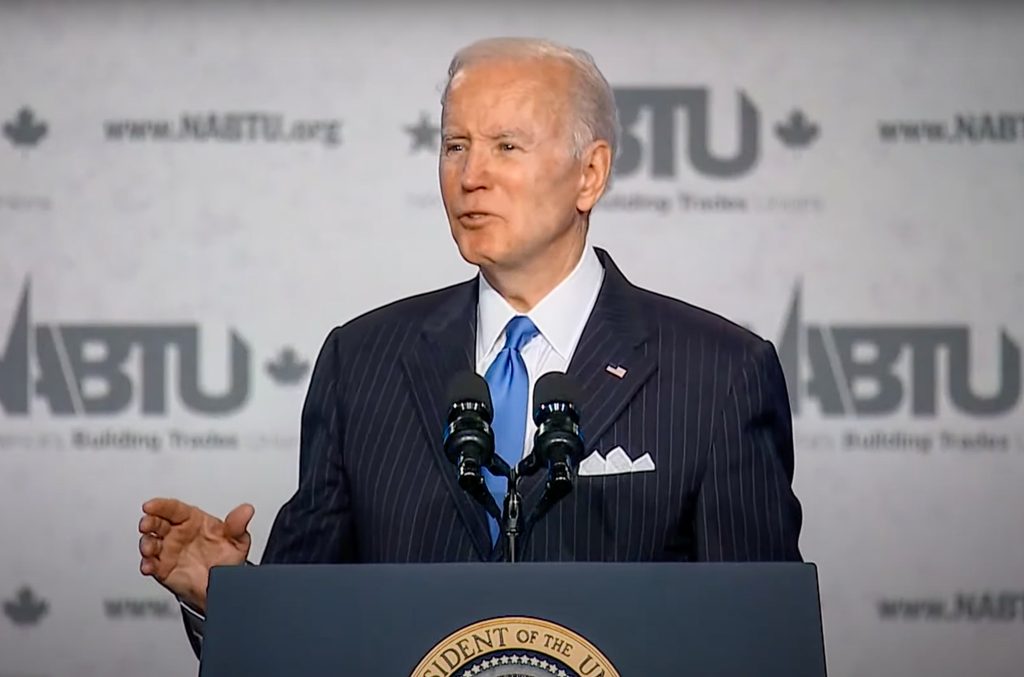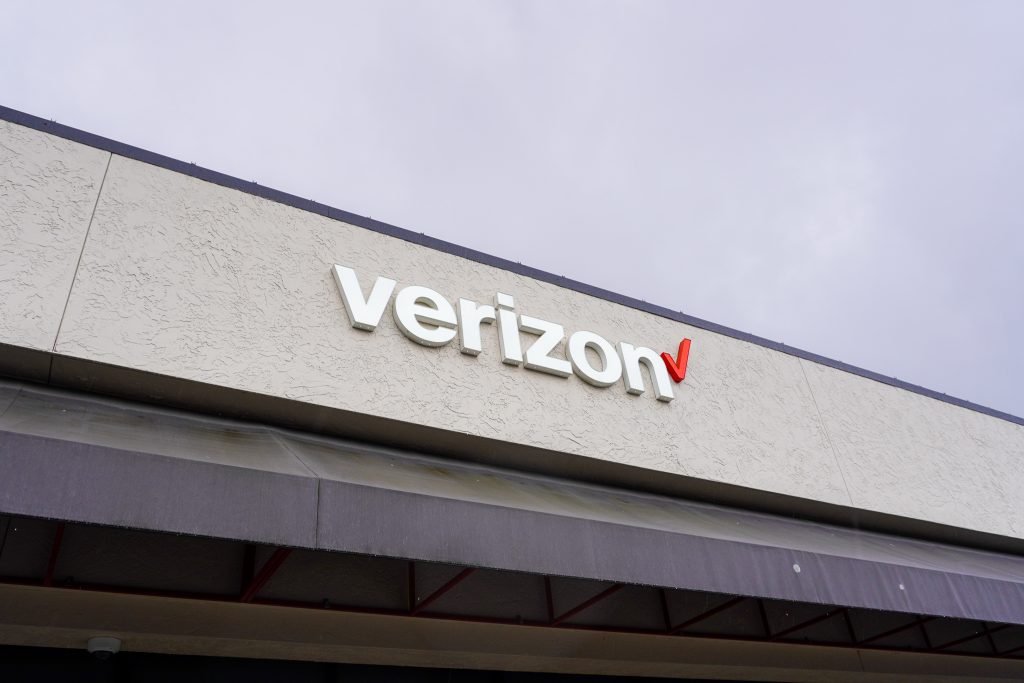LYNNWOOD, Wash., April 9, 2022 – Employees who work between two Verizon locations in Everett and Lynnwood began casting their ballots to unionize on March 25. Austin Hitch, one of the employees leading the effort, recounts Verizon’s union-busting tactics, shares why he and his coworkers are seeking to unionize and sends a message to his fellow retail workers.
“One of the things we’re out to prove is basically look, we can unionize,” says Hitch. “We can stand up to Verizon, and Verizon’s not going to close our store and fire us all.”
Hitch, a full-time Solutions Specialist who’s worked at Verizon for nine years, reached out to Communications Workers of America (CWA) Labor Union on February 4 this year and heard back from them the next day.
By March 11, Hitch and his coworkers had signed Union Authorization Cards and sent an email to Verizon CEO Hans Vestberg requesting Voluntary Union Recognition.
Verizon and Vestberg did not respond.
“But I know that they got the email,” Hitch says, “because the next day, they flew out an ‘HR Business Consultant,’ which is Verizon’s in-house Union Busting Team.”
Verizon’s union-busting efforts
Verizon’s “union-busting team” included a Human Resources Business Consultant and the Senior Vice President of Retail. Unbeknownst to Verizon, though, Hitch and his coworkers have been in contact with Verizon employees in Brooklyn who unionized in 2014 and have been through the wringer with the company’s anti-union tactics, especially during a strike in 2016.
“We were prepared,” Hitch recalls. “We talked to some of the Brooklyn organizers, so we knew how it went. They even told us the same names [of the union-busting personnel], you know? They told us, ‘[So-and-so] is going to show up.”
Hitch describes the union-busting team’s strategy as a “Good Cop, Bad Cop” approach.
“Essentially, their union-busting tactic was exactly the same as what it was back in 2016,” Hitch explains. “It was [the HR Consultant] shows up. She’s super friendly. She gets to know everybody. She’s listening for all the problems, listening for all the reasons we’re organizing.”
“And then the next day, the executive comes in and plays the bad cop and uses everything that they discovered against us,” Hitch continues. “So most of us were smart enough not to tell them real things because we knew they were only there to respond to unionizing.”

The union-busting team’s case against unionizing, according to Hitch, relied on mischaracterizing the nature of unions and gaslighting employees into questioning their circumstances.
“Some of the lies that they try to tell us is, ‘Oh, the union’s this third-party—this third-party’s going to come in, and CWA’s going to make all your decisions, and you’re just going to be beholden to whatever they decide,’ which is not true,” says Hitch. “The union is us—the workers coming together democratically to have a collective voice in our workplace.”
“They also try to tell you, ‘Oh, we didn’t know it was this bad,’ and then they also try to tell us, ‘Oh, I’ve been talking to all your coworkers at other stores around you, and none of them are having this bad of an experience,’” he says.
Hitch also noted how the Vice President of Retail tried convincing them to postpone the vote for a year to give her a chance to resolve the issues. “And 100%, everybody involved would be fired,” he says. “I mean, in that year, it would have been over with. So if you hear that lie from an executive, don’t believe it.”
President Biden’s promises
Absent from this developing story is any action or comment from U.S. President Joe Biden, who has asserted his pro-union stance on several occasions, even saying that he intends to “be the most pro-union President leading the most pro-union administration in American history.”
President Biden also decried corporations’ union-busting efforts back in March 2021. He said, “after generations of sweat and sacrifice, fighting hard to earn the wages and benefits that built and sustained the American middle class, unions are under siege. Nearly 60 million Americans would join a union if they get a chance, but too many employers and states prevent them from doing so through anti-union attacks.”

Even more noteworthy is President Biden’s pledge to “Ensure federal dollars do not flow to employers who engage in union-busting activities, participate in wage theft, or violate labor law,” as noted in his plan for strengthening unions.
Despite its blatant union-busting attempts, Verizon retains millions of dollars in federal contracts. Just last month, the company was awarded nearly $1 billion by the Department of Defense.
“If Biden wants to put his money where his mouth is, so to speak, he can pull federal contracts for people who don’t have unions,” says Hitch.
“I mean AT&T, they’re fully unionized, and they are just as prepared as Verizon, I imagine, to handle whatever federal contracts Verizon has. But I mean just threatening that, ‘hey, if you’re going to union-bust, have on staff union-busting, then we’re not going to have federal contracts.’”
Though Biden did recognize the newly-unionized Amazon workers in New York during a North America’s Building Trades Unions (NABTU) conference on April 6, saying, “Amazon, here we come,” a quote from White House Press Secretary Jen Psaki suggests that he never intended on getting directly involved with unionizing efforts.
When asked whether or not President Biden endorsed the unionization at Amazon hours after his NABTU address, Secretary Psaki said, “What he was conveying is his long-time support for collective bargaining, for the rights of workers to organize, and their decision to do exactly that in this case,” according to a Reuters report.
Battles for unions across the nation
Amazon has a verifiable history of busting attempts to unionize. In 2018, a leaked instructional video for Amazon warehouse managers revealed how they were trained to identify “the early warning signs of potential organizing.” As the video states, “the most obvious signs would include use of words associated with unions or union-led movements like ‘living wage’ or ‘steward.’”
The video also warned of potential union-organizing related behavior, such as “associates who normally aren’t connected to each other suddenly hanging out together.”
In February 2021, a Washington Post report detailed Amazon’s relentless anti-union messaging to employees of an Alabama warehouse that were set to begin casting ballots the next week. The employees had to attend “mandated anti-union meetings” and received nearly five texts a day from Amazon urging employees not to abandon “the winning team.”
Leading up to the union vote in Staten Island, New York, Amazon not only paid for anti-union ads on Facebook and Instagram but “sent letters to workers’ homes, called them on the phone, posted anti-union messages at its facility — including in the bathrooms, hallways above ATMS and other common areas,” the New York Post reports.
On the heels of Amazon’s unionization in New York, The Intercept reported that the corporation plans to block certain words including “union,” “restrooms,” and “pay raise” on a work messenger app Amazon plans to launch this month.
However, as Amazon spokesperson Barbara M. Agrait told The Intercept, “This particular program has not been approved yet and may change significantly or even never launch at all.”
Hitch said that Amazon Labor Union’s victory “was super inspiring,” but for Hitch and his coworkers, the recent union victories among Starbucks employees have been more relatable.
In December of last year, the coffee chain saw its first location unionize in Buffalo, New York. Since that time, ten more Starbucks locations have voted, and it’s estimated that another 160 locations across the States will vote within the next couple of months despite the company’s efforts to bust unions. Starbucks employed many of the same tactics as Amazon, including sending employees anti-union text messages and mandating anti-union meetings.
“Starbucks, honestly, was more inspiring to us than Amazon just because of the way that our stores are staffed and the fact that we’re retail workers working with the public,” says Hitch. “I feel like we as a team are closer to Starbucks than to Amazon. And they’re small; they’re a staff of 15 to 18 people like us.”
Why employees at Verizon want to unionize
While the vote to unionize is currently underway, Hitch says he and his coworkers began considering the idea four to five years ago when looking to improve their work-life balance and halt the regression of compensation.
“The main thing we’re looking for is just some sort of consistency and work-life balance,” Hitch explains. “It’s always been that our schedules are just totally random; we never have the same two days off. Most of the time, we don’t have two in a row, so we end up working eight days in a row.”

Another impediment to work-life balance at Verizon has been mandatory, unscheduled overtime when customers remain in the stores after closing hours.
“That was really the first complaint that me and my coworkers all had—like what is our legal protection for mandatory, unscheduled overtime?” Hitch recalls, “How do we say no to this?”
Hitch and his colleagues soon discovered that there are no specific protections for employees against mandatory, unscheduled overtime at the state or federal level. (While Seattle did pass a “Secure Scheduling” ordinance, it does not pertain to employees in Lynnwood or Everett).
Though Hitch understands that serving customers after store hours is an inescapable component of most retail roles, it became a serious issue for Verizon employees due to the lack of support and diminishing financial incentives.
“Verizon’s just cut off a lot of our support; they’ve been laying people off for years. We used to have way more staff,” Hitch says, explaining how losing staff in sales, management, and operation specialists has increased the workload for Verizon employees.
Speaking about the lack of financial incentive, Hitch recounts how the pay structure has dramatically shifted away from individual commissions and is now based on flat wages and team commissions.
“In the past, we put up with [helping customers after hours] because we were individual commission so that one customer you’re helping [could] move [your] dollar amount forward. Verizon changed that commission-based structure to team-based commission, and I think that was one of the big reasons—I mean, we came together as a team because of it, but we also came together as a team in another way that Verizon didn’t want,” he laughs.
For Hitch, when he first began working at Verizon nine years ago, hourly wage mattered little because of the individual commission rate. “But they’ve sort of slowly been shifting that,” he says. “So now our commission is like 25%, and our base pay is the majority of that. For me and a lot of my long-time co-workers, it’s ended up just cutting our pay drastically over the years.”
As a result, Hitch estimates that he makes about $10k less a year compared to when he first started at Verizon. Many middle and lower-class Americans are likely too familiar with the impacts of such a pay cut, given the significant spikes in gas prices and inflation rates, not to mention the affordable housing crisis in the state.
Another reason Verizon employees seek to unionize is that they want a voice in the workplace. “There’s a lot of good things Verizon provides, and we want to make sure that those are set in stone—that they can’t just be taken away from us,” says Hitch referring to Verizon’s 401k and health benefit programs.
“And the trajectory has just been taking away support, taking away money—like I feel like that’s next. So my coworkers and I wanted to make a floor so that that stops getting worse, and then we can battle for things to get better.”
In conclusion, Hitch says, “[Verizon’s] not a terrible place to work […] but it will be a better place to work in the near future.”
“Join the movement” to unionize at Verizon
The National Labor Relations Board is scheduled to count the Verizon employees’ vote on April 15, and Hitch is confident they have the majority. “Most everybody has sent in their ballots,” he says. “There’s still one or two people I need to make sure have mailed theirs, but other than that, I would say we have unanimous support.”
In his closing remarks with the Lynnwood Times, Hitch said, “My message would be to fellow retail workers across all industries: If your company makes profits in the billions and your paycheck is dwindling, it’s time to stand up. It’s time to seek representation. It’s time to get together with your coworkers and join the movement.”
At the time of this publication, Verizon has not responded to the Lynnwood Time’s request for comments.
Author: Bo John Brusco













One Response